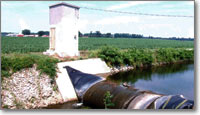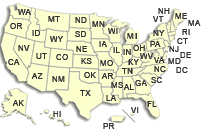
ABOUT THE NC WATER OFFICE
USGS IN YOUR STATE
USGS Water Science Centers are located in each state.

|
North Carolina Projects and Studies
Agriculture and Water Quality
Understand the hydrological, chemical, biological, and physical processes that determine the effects of agricultural practices on the State's water and aquatic biological resources.
| Albemarle-Pamlico NAWQA |
 |
The National Water Quality Assessment (NAWQA) Study is an ongoing program of the U.S. Geological Survey to assess the status and trends of the Nation's streams and groundwater quality and to examine the processes that control water quality.
Science Topic:
Increased Population and Water Resources
Groundwater resources
Agriculture and Water Quality
Estuarine and Coastal Processes
Support of Federal and State Programs
|
| Albemarle Sound National Monitoring Network Pilot |
 |
A Water-Quality Monitoring Network for Albemarle Sound will be developed to examine critical water-quality management issues as a pilot study of the National Monitoring Network for U.S. Coastal Waters and their Tributaries.
Science Topic:
Increased Population and Water Resources
Groundwater resources
Agriculture and Water Quality
Estuarine and Coastal Processes
Support of Federal and State Programs
|
| Surface-Water Quality and Swine CAFOs |
 |
This study is designed to characterize stream water-quality conditions in Coastal Plain watersheds to document whether swine concentrated animal feeding operations (CAFOs) have a measurable effect on surface water nutrient concentrations. It will provide a scientific basis for water-resource managers and policy makers to evaluate existing, or establish new, regulations or procedures at permitted CAFOs for protecting and enhancing stream water quality in nutrient impaired waters in eastern North Carolina.
Science Topic:
Agriculture and Water Quality
Support of Federal and State Programs
|
| Factors affecting nitrogen and phosphorus loads in nutrient-sensitive waters of eastern North Carolina |
 |
The primary study objectives include advancing the NC Department of Water Quality's development and implementation of management strategies for reducing nitrogen and phosphorus loadings in eastern North Carolina by 1) providing data necessary for addressing TMDL allocations and targeting watersheds where restoration efforts will be most effective, and 2) developing methods for identifying watersheds that are most likely to export nutrients (total nitrogen, total nitrate, and total phosphorus) from nonpoint-source pollution.
Science Topic:
Agriculture and Water Quality
Support of Federal and State Programs
|
| Effects of land-applied biosolids on water quality in the Jordan Lake Watershed |
 |
The practice of applying biosolids from municipal wastewater treatment plants to agricultural fields is becoming commonplace across much of the Piedmont and Coastal Plain of North Carolina. In 2009, there were 5,145 fields (107,000 acres) permitted for land application of municipal biosolids in North Carolina.
However, recent studies have shown that biosolids can pose a threat to human and environmental health. The impact of land applied municipal biosolids to agricultural fields on delivery of nutrients, bacteria, metals and emerging contaminants to surface water and groundwater resources is largely unknown. The lack of data from existing sites makes it difficult for the NC Division of Water Quality to assess how well existing regulations protect the waters of the State or to even recommend effective changes to regulations or procedures.
Science Topic:
Agriculture and Water Quality
Support of Federal and State Programs
|
|

